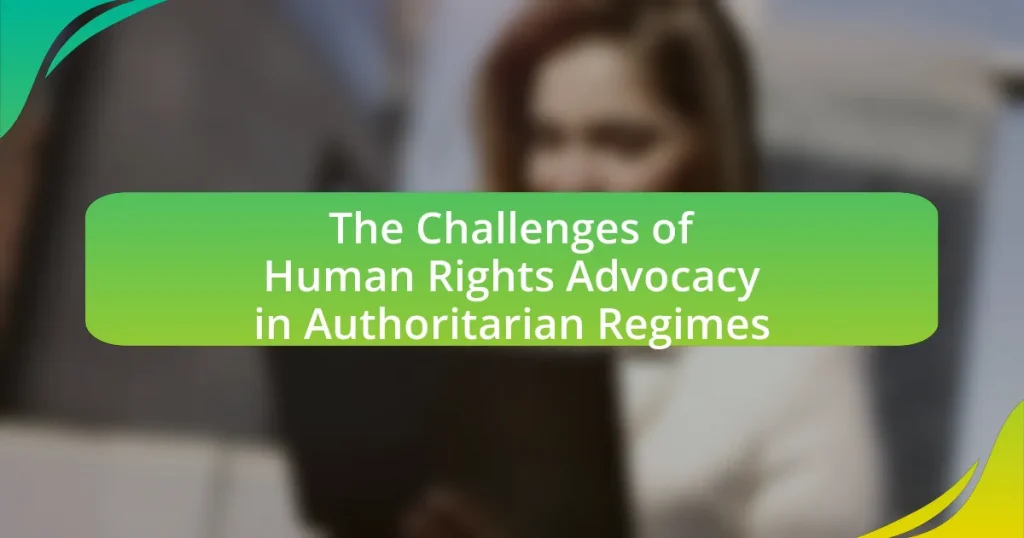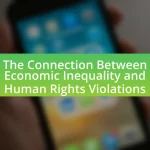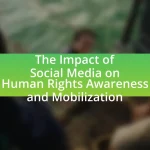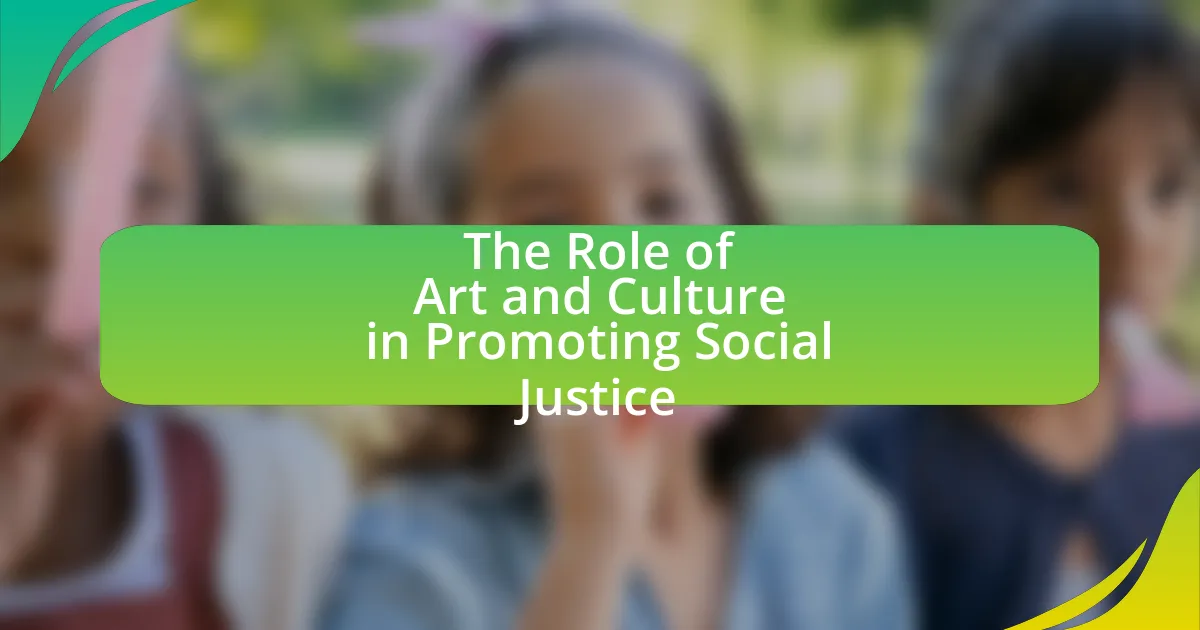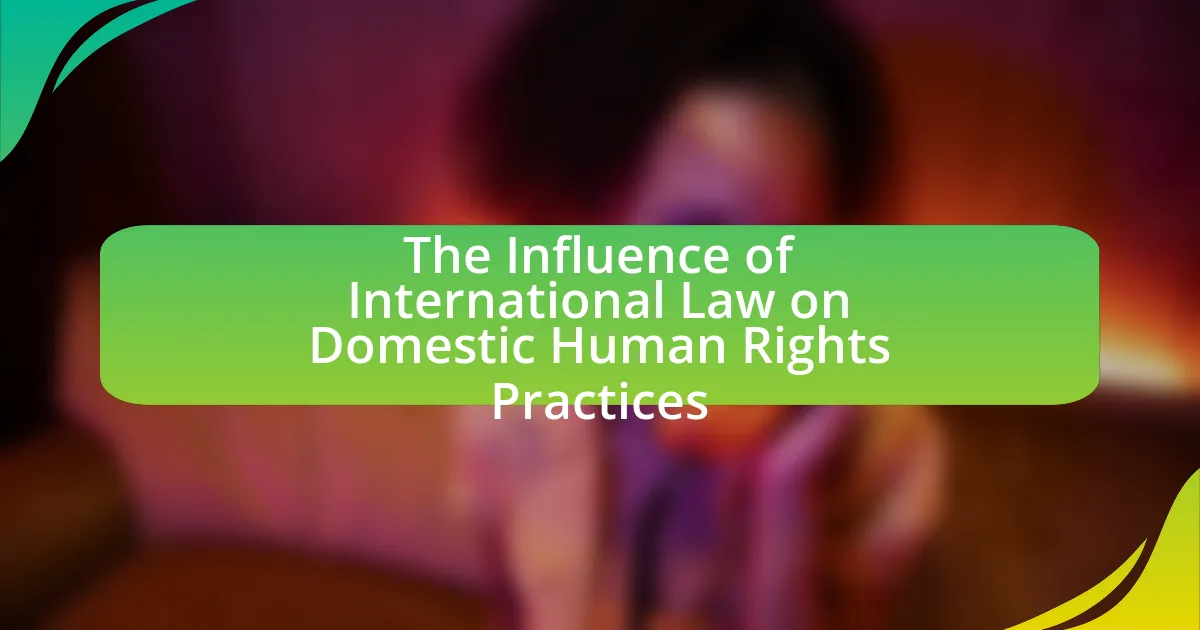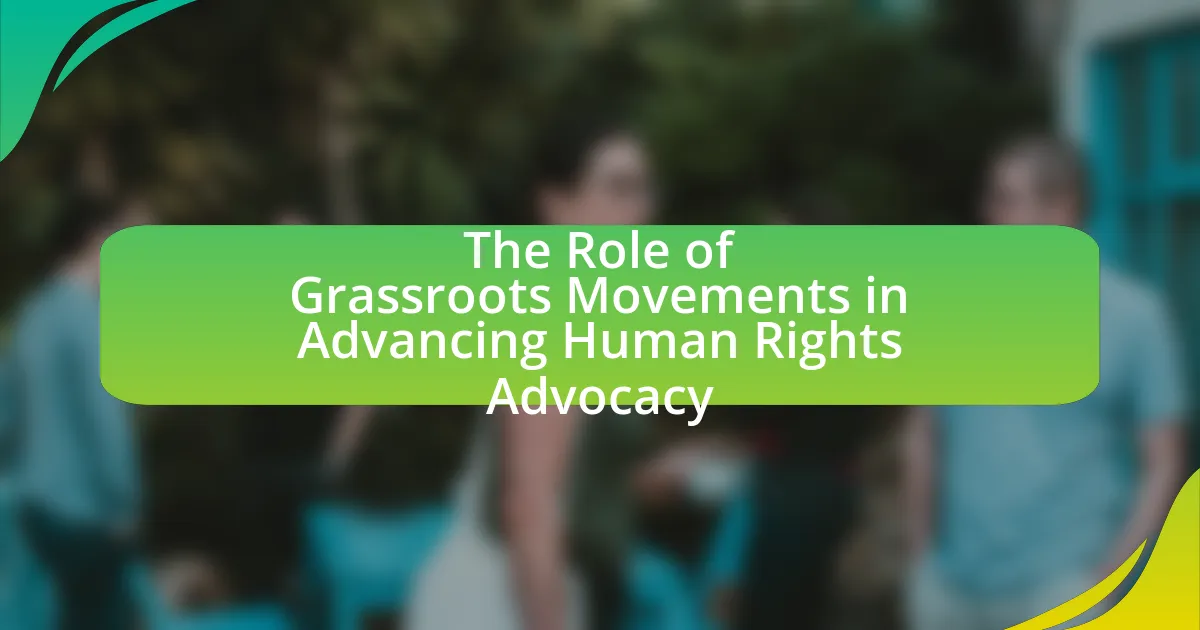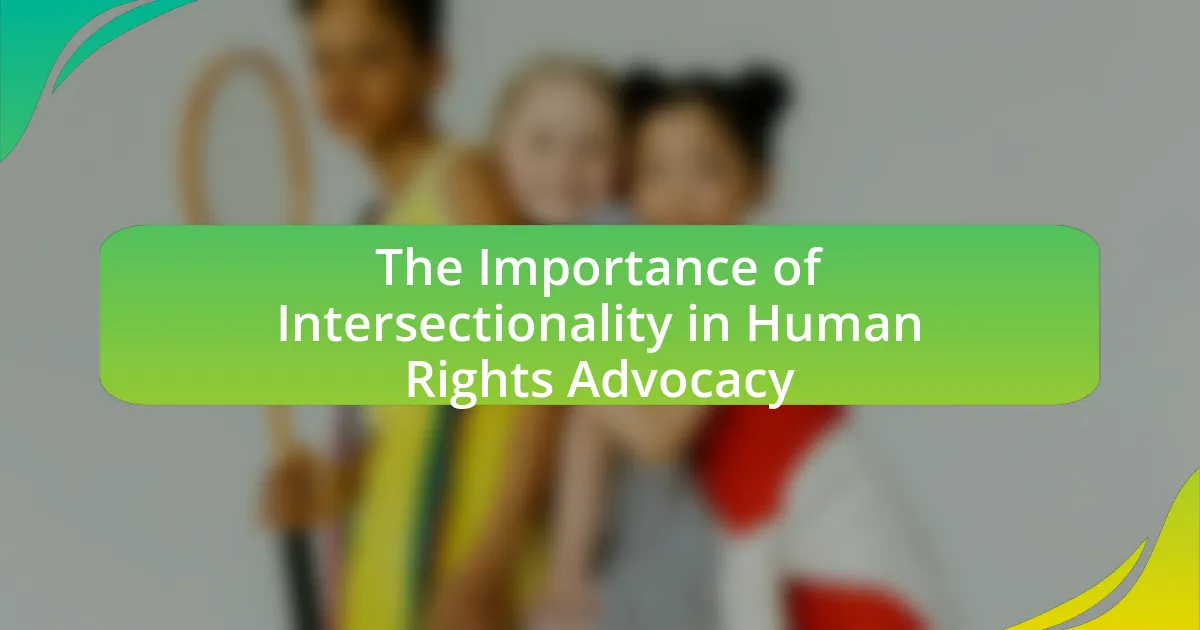The article examines the challenges of human rights advocacy in authoritarian regimes, highlighting key obstacles such as repression of dissent, lack of legal protections, and restricted access to information. It details how authoritarian governments suppress advocacy through legal restrictions, censorship, intimidation, and violence, creating a hostile environment for activists. The article also discusses the importance of international support, innovative strategies for overcoming repression, and the role of technology and grassroots mobilization in enhancing advocacy efforts. Additionally, it outlines practical steps individuals can take to support human rights initiatives in these oppressive contexts.
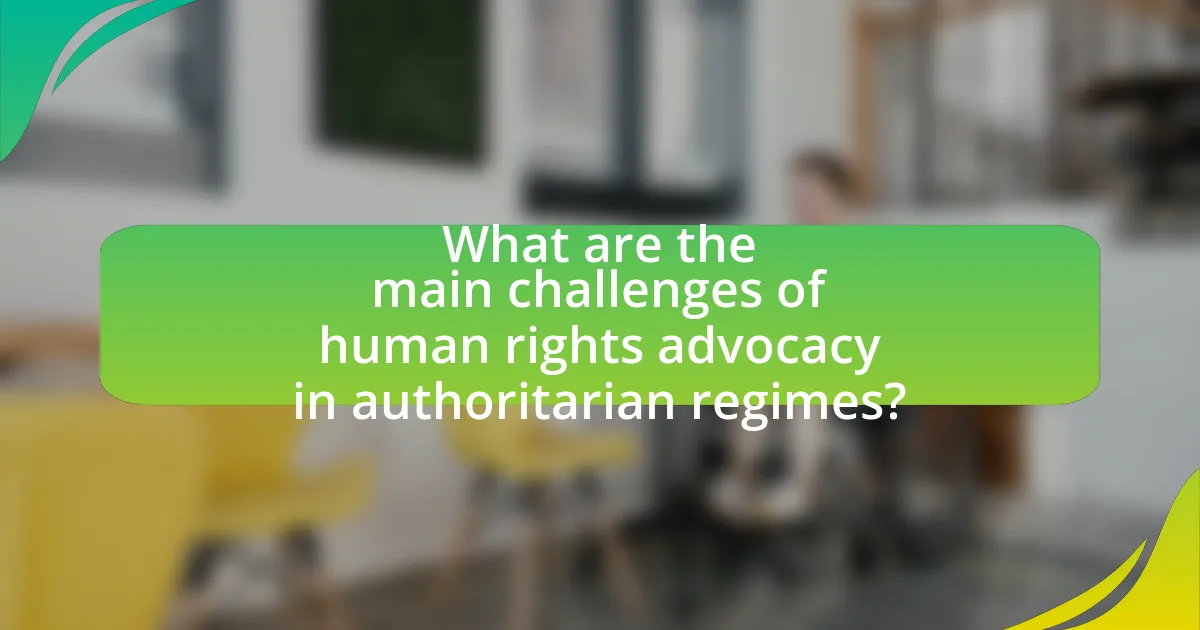
What are the main challenges of human rights advocacy in authoritarian regimes?
The main challenges of human rights advocacy in authoritarian regimes include repression of dissent, lack of legal protections, and restricted access to information. Repression of dissent manifests through intimidation, imprisonment, or violence against activists, as seen in countries like Belarus, where authorities have cracked down on protests and jailed opposition leaders. The absence of legal protections for human rights defenders further complicates advocacy efforts, as laws are often manipulated to silence critics, exemplified by the use of anti-terrorism laws in Russia to target NGOs. Additionally, restricted access to information limits the ability of advocates to raise awareness and mobilize support, as seen in North Korea, where state-controlled media prevents the dissemination of independent human rights reports. These factors collectively hinder effective human rights advocacy in authoritarian contexts.
How do authoritarian regimes suppress human rights advocacy?
Authoritarian regimes suppress human rights advocacy through a combination of legal restrictions, censorship, intimidation, and violence. These governments often enact laws that criminalize dissent, such as laws against defamation or public assembly, effectively silencing opposition voices. For instance, in countries like China and Russia, activists face severe penalties for organizing protests or disseminating information that contradicts state narratives. Additionally, authoritarian regimes employ state-controlled media to censor information and promote propaganda, limiting the public’s access to independent news sources. Intimidation tactics, including harassment, surveillance, and imprisonment of human rights defenders, further deter advocacy efforts. Reports from organizations like Amnesty International and Human Rights Watch document these practices, highlighting the systematic approach authoritarian regimes take to undermine human rights advocacy and maintain control over their populations.
What tactics do authoritarian governments use to silence dissent?
Authoritarian governments employ various tactics to silence dissent, including censorship, surveillance, intimidation, and imprisonment. Censorship involves controlling the media and restricting access to information, as seen in countries like North Korea, where the state monopolizes news outlets. Surveillance is prevalent in regimes such as China, where the government monitors online activities and communications to preemptively identify and suppress dissent. Intimidation tactics, including harassment and threats against activists, are common in Russia, where opposition figures face violent reprisals. Imprisonment of dissenters is exemplified by the jailing of political opponents in countries like Turkey, where dissent is often criminalized. These tactics collectively undermine human rights and stifle free expression in authoritarian regimes.
How does censorship impact the effectiveness of human rights advocacy?
Censorship significantly undermines the effectiveness of human rights advocacy by restricting access to information and silencing dissenting voices. In authoritarian regimes, where censorship is prevalent, advocates face obstacles such as limited freedom of expression and the suppression of critical narratives, which hampers their ability to raise awareness and mobilize support for human rights issues. For instance, according to a report by Freedom House, countries with high levels of censorship often experience a decline in civil liberties, making it difficult for human rights organizations to operate effectively. This suppression not only stifles public discourse but also creates an environment of fear, discouraging individuals from participating in advocacy efforts.
Why is international support crucial for human rights advocacy in these regimes?
International support is crucial for human rights advocacy in authoritarian regimes because it amplifies the voices of local activists and provides essential resources for their efforts. This support can include diplomatic pressure, funding, and public awareness campaigns that challenge oppressive practices. For instance, the United Nations and various NGOs have successfully pressured governments to improve human rights conditions by leveraging international treaties and public opinion, as seen in cases like South Africa during apartheid. Such international backing not only legitimizes local movements but also creates a safer environment for activists, as it raises the stakes for regimes that might otherwise act with impunity.
What role do international organizations play in supporting local advocates?
International organizations play a crucial role in supporting local advocates by providing resources, training, and platforms for visibility. These organizations often offer financial assistance, enabling local advocates to sustain their initiatives and campaigns. For instance, the United Nations and various non-governmental organizations (NGOs) facilitate workshops and training sessions that enhance the skills of local human rights defenders, equipping them with strategies to navigate the challenges posed by authoritarian regimes. Additionally, international organizations amplify the voices of local advocates through global campaigns and reports, drawing international attention to human rights abuses and increasing pressure on oppressive governments. This support is vital, as it not only legitimizes the work of local advocates but also fosters a network of solidarity that can lead to more effective advocacy efforts.
How can global awareness influence change in authoritarian contexts?
Global awareness can influence change in authoritarian contexts by mobilizing international pressure and support for human rights initiatives. When global awareness is raised about human rights abuses, it can lead to sanctions, diplomatic interventions, and increased scrutiny from international organizations. For example, the global outcry over the 2011 Syrian uprising prompted various nations to impose sanctions on the Assad regime, highlighting how international awareness can lead to tangible consequences for authoritarian leaders. Additionally, social media campaigns have played a crucial role in amplifying voices from within authoritarian regimes, as seen during the Arab Spring, where global attention helped to galvanize local movements for change.
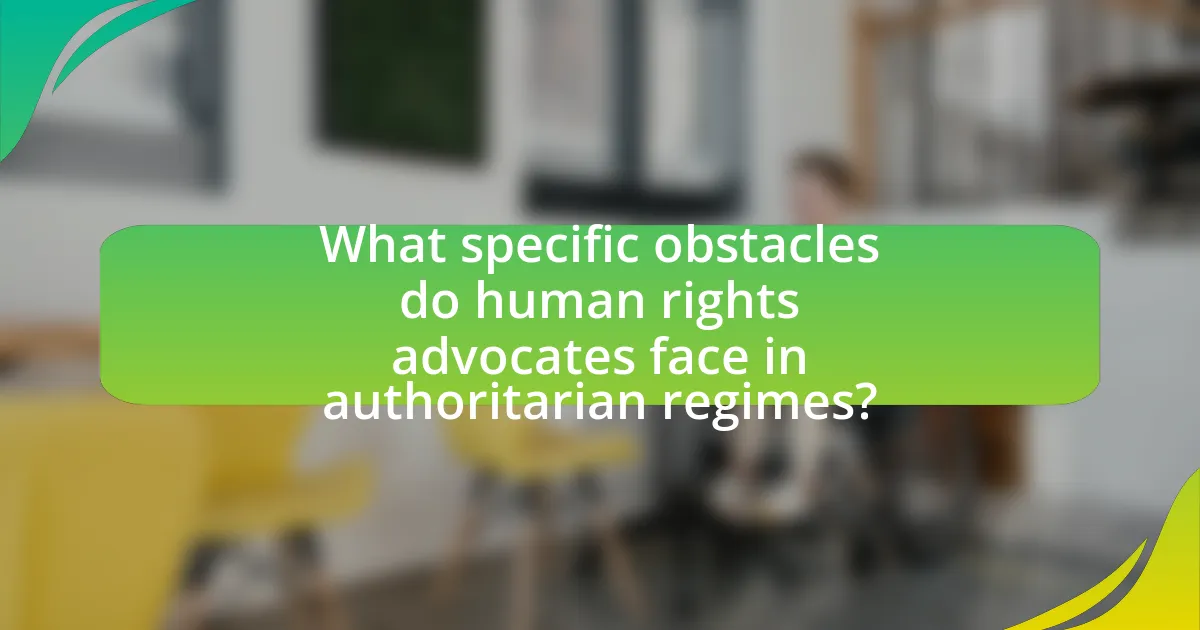
What specific obstacles do human rights advocates face in authoritarian regimes?
Human rights advocates in authoritarian regimes face significant obstacles, including repression, censorship, and legal restrictions. Repression manifests through harassment, imprisonment, and violence against activists, as seen in countries like Belarus, where authorities have detained thousands of protesters. Censorship limits access to information and stifles free expression, exemplified by the Great Firewall in China, which blocks numerous foreign websites and social media platforms. Legal restrictions often criminalize dissent, as in Russia, where laws against “foreign agents” target NGOs and activists, hindering their ability to operate. These challenges create a hostile environment that severely impedes the work of human rights advocates.
How does fear of persecution affect advocacy efforts?
Fear of persecution significantly hampers advocacy efforts by creating an environment of intimidation that discourages individuals from speaking out. In authoritarian regimes, activists often face threats of violence, imprisonment, or social ostracism, which can lead to self-censorship and reduced public engagement in human rights issues. For instance, a report by Human Rights Watch highlights that in countries like Belarus and Russia, activists have been arrested or harassed, leading to a chilling effect on advocacy campaigns. This fear not only limits the number of voices advocating for change but also stifles the dissemination of critical information, ultimately undermining the effectiveness of human rights movements.
What are the psychological impacts of living under an authoritarian regime for advocates?
Living under an authoritarian regime significantly impacts the psychological well-being of advocates, often leading to heightened anxiety, depression, and feelings of helplessness. Advocates frequently experience constant surveillance, repression, and threats, which contribute to chronic stress and a pervasive sense of fear. Research indicates that such environments can lead to post-traumatic stress disorder (PTSD) among those who face violence or intimidation for their beliefs, as seen in studies conducted by the International Journal of Mental Health Systems. Furthermore, the isolation from supportive networks and the suppression of free expression can exacerbate feelings of loneliness and despair, undermining the advocates’ mental health and resilience.
How do threats and violence deter potential advocates?
Threats and violence significantly deter potential advocates by instilling fear and creating a hostile environment for activism. When individuals witness or experience intimidation, harassment, or physical harm, they are less likely to engage in advocacy efforts due to concerns for their safety and well-being. Research indicates that in authoritarian regimes, such as those documented in the “Civilians Under Threat: The Impact of Violence on Human Rights Advocacy” report by the Human Rights Watch, the prevalence of violence against activists leads to a chilling effect, where potential advocates withdraw from public discourse and activism to avoid repercussions. This dynamic ultimately weakens the overall movement for human rights and social change, as fewer individuals are willing to take risks in environments marked by threats and violence.
What legal barriers exist for human rights advocacy in these regimes?
Legal barriers for human rights advocacy in authoritarian regimes include restrictive laws, censorship, and criminalization of dissent. These regimes often implement legislation that limits freedom of assembly, expression, and association, making it illegal for individuals to organize or participate in human rights activities. For instance, laws may require permits for public gatherings, which are frequently denied, or impose severe penalties for those who criticize the government. Additionally, many authoritarian governments utilize censorship to control information, blocking access to independent media and online platforms that facilitate advocacy. The criminalization of dissent is evident in the prosecution of activists under vague charges such as “subversion” or “terrorism,” which serve to intimidate and silence opposition. These legal frameworks effectively stifle human rights advocacy and create an environment of fear, limiting the ability of individuals and organizations to operate freely.
How do restrictive laws limit the activities of human rights organizations?
Restrictive laws limit the activities of human rights organizations by imposing stringent regulations that hinder their ability to operate freely. These laws often include requirements for registration, funding restrictions, and prohibitions on certain types of advocacy, which can lead to reduced visibility and effectiveness. For instance, in countries like Russia and China, laws targeting foreign funding have severely restricted the financial resources available to these organizations, thereby crippling their operational capacity. Additionally, punitive measures against activists and organizations that defy these laws create an environment of fear, discouraging public engagement and advocacy efforts.
What are the consequences of operating outside legal frameworks?
Operating outside legal frameworks can lead to severe consequences, including legal penalties, loss of credibility, and increased risks to personal safety. Individuals or organizations that engage in activities without legal authorization may face criminal charges, fines, or imprisonment, as seen in various authoritarian regimes where dissent is often met with harsh legal repercussions. Additionally, operating outside these frameworks can undermine the legitimacy of advocacy efforts, making it difficult to gain public support or engage with international bodies. For instance, in countries like Belarus, activists who operate outside legal parameters often find themselves targeted by state security forces, resulting in arrests and violence. This illustrates the high stakes involved in human rights advocacy within authoritarian contexts, where adherence to legal frameworks is crucial for both safety and effectiveness.
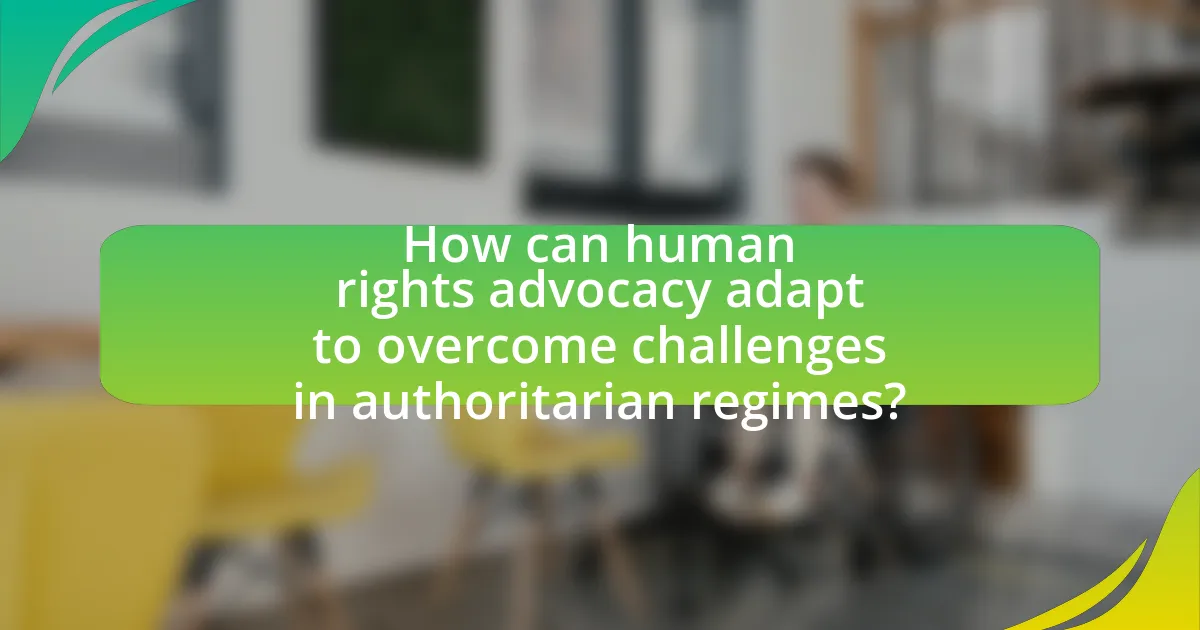
How can human rights advocacy adapt to overcome challenges in authoritarian regimes?
Human rights advocacy can adapt to overcome challenges in authoritarian regimes by employing innovative strategies such as digital activism, coalition-building, and leveraging international pressure. Digital activism allows advocates to bypass state-controlled media and reach wider audiences, as seen in movements like the Arab Spring, where social media played a crucial role in mobilizing support. Coalition-building among local and international organizations enhances resource sharing and amplifies voices, exemplified by the collaboration between Amnesty International and local NGOs in various countries. Additionally, leveraging international pressure through diplomatic channels and sanctions can compel authoritarian regimes to reconsider their human rights practices, as evidenced by the impact of sanctions on Myanmar following its military coup in 2021.
What innovative strategies can advocates employ to navigate repression?
Advocates can employ digital security measures, grassroots mobilization, and strategic alliances to navigate repression. Digital security measures, such as encrypted communication and secure data storage, protect sensitive information from surveillance and interception by authoritarian regimes. Grassroots mobilization fosters community support and resilience, enabling advocates to organize protests and awareness campaigns despite governmental pushback. Strategic alliances with international organizations and NGOs can amplify voices and provide resources, creating pressure on repressive regimes. For instance, the use of social media platforms has been pivotal in organizing movements like the Arab Spring, demonstrating the effectiveness of these strategies in challenging authoritarian control.
How can technology be leveraged to enhance advocacy efforts?
Technology can be leveraged to enhance advocacy efforts by utilizing digital platforms for communication, mobilization, and data collection. For instance, social media enables activists to reach a global audience quickly, raising awareness about human rights violations in authoritarian regimes. According to a study by the Pew Research Center, 69% of adults in the U.S. use social media, which demonstrates its potential for widespread engagement. Additionally, tools like encrypted messaging apps ensure secure communication among activists, protecting them from surveillance. Furthermore, data analytics can help organizations identify trends and measure the impact of their advocacy, as seen in the use of big data by organizations like Human Rights Watch to document abuses effectively.
What role does grassroots mobilization play in challenging authoritarianism?
Grassroots mobilization plays a crucial role in challenging authoritarianism by empowering individuals and communities to collectively advocate for their rights and demand political change. This form of mobilization fosters a sense of agency among citizens, enabling them to organize protests, raise awareness, and build networks that can effectively counter oppressive regimes. Historical examples, such as the Arab Spring, illustrate how grassroots movements can lead to significant political transformations by uniting diverse groups around common goals, thereby undermining the legitimacy of authoritarian governments. Additionally, grassroots efforts often leverage social media and community organizing to amplify their messages, making it difficult for authoritarian regimes to suppress dissent without facing widespread backlash.
What best practices can enhance the effectiveness of human rights advocacy?
Effective human rights advocacy can be enhanced through strategic coalition-building, targeted messaging, and leveraging technology. Coalition-building allows diverse organizations to unite their resources and amplify their voices, which is crucial in authoritarian regimes where individual efforts may be suppressed. Targeted messaging ensures that advocacy efforts resonate with specific audiences, increasing the likelihood of engagement and support. Additionally, leveraging technology, such as social media and secure communication tools, enables advocates to disseminate information widely and safely, circumventing state censorship. These practices have been shown to increase visibility and mobilize public support, as evidenced by successful campaigns like the Arab Spring, where coordinated efforts led to significant political change.
How can building coalitions strengthen advocacy efforts?
Building coalitions can significantly strengthen advocacy efforts by uniting diverse groups to amplify their collective voice and resources. When organizations collaborate, they can share expertise, mobilize larger audiences, and increase their influence on policymakers. For instance, coalitions can leverage the combined credibility of their members to advocate for human rights more effectively, as seen in successful campaigns like the Coalition for the International Criminal Court, which brought together over 2,500 organizations to push for accountability in war crimes. This collaborative approach not only enhances visibility but also fosters solidarity among various stakeholders, making it harder for authoritarian regimes to dismiss or suppress their demands.
What are the key elements of a successful advocacy campaign in repressive environments?
The key elements of a successful advocacy campaign in repressive environments include strategic messaging, coalition building, and leveraging technology for secure communication. Strategic messaging ensures that the campaign resonates with the target audience and addresses their specific concerns, which is crucial in environments where dissent is often silenced. Coalition building among diverse stakeholders, including local organizations and international allies, enhances credibility and amplifies the campaign’s reach. Additionally, leveraging technology, such as encrypted communication tools and social media platforms, allows advocates to organize discreetly and disseminate information effectively, even under surveillance. These elements are essential for navigating the complexities of advocating for human rights in authoritarian regimes, where traditional methods may be stifled.
What practical steps can individuals take to support human rights advocacy in authoritarian regimes?
Individuals can support human rights advocacy in authoritarian regimes by raising awareness, engaging in advocacy, and providing financial support to organizations working on the ground. Raising awareness involves sharing information about human rights abuses through social media, blogs, and community events, which can mobilize public opinion and pressure governments. Engaging in advocacy includes contacting representatives to urge them to take action, participating in protests, and joining campaigns that highlight specific human rights issues. Providing financial support to reputable human rights organizations, such as Amnesty International or Human Rights Watch, enables them to continue their work in documenting abuses and supporting victims. These actions collectively contribute to a stronger global response to human rights violations in authoritarian contexts.
